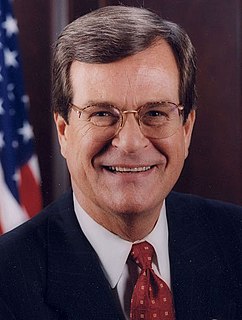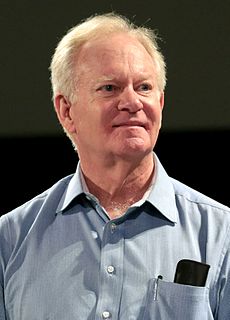
The 1998 United States Senate elections were held on November 3 and seen as an even contest between the Republican Party and Democratic Party. While the Democrats had to defend more seats up for election, Republican attacks on the morality of President Bill Clinton failed to connect with voters and anticipated Republican gains did not materialize. The Republicans picked up open seats in Ohio and Kentucky and narrowly defeated Democratic incumbent Carol Moseley Braun (Illinois), but these were cancelled out by the Democrats' gain of an open seat in Indiana and defeats of Republican Senators Al D'Amato and Lauch Faircloth. The balance of the Senate remained unchanged at 55–45 in favor of the Republicans. With Democrats gaining five seats in the House of Representatives, this marked the first time since 1934 that the out-of-presidency party failed to gain congressional seats in a mid-term election, and the first time since 1822 that the party not in control of the White House failed to gain seats in the mid-term election of a President's second term. These are the last senate elections that resulted in no net change in the balance of power.

The 1978 United States Senate elections in the middle of Democratic President Jimmy Carter's term. Thirteen seats changed hands between parties. The Democrats at first lost a net of two seats to the Republicans, and then one more in a special election. Democrats nevertheless retained a 58-41 majority.
The Democratic Party of Indiana is the affiliate of the U.S. Democratic Party in the U.S. state of Indiana.

The Indiana gubernatorial election of 2008 was held on November 4, 2008. Incumbent Republican nominee Mitch Daniels was challenged by Democratic nominee Jill Long Thompson and Libertarian nominee Andy Horning. Daniels easily won reelection, defeating Long Thompson by over 17 points.

The Alabama gubernatorial election of 1958 was held on November 3, 1958. Incumbent Democrat Jim Folsom was term limited and could not seek a second consecutive term.

W. Wayne Townsend was an American politician from the U.S. state of Indiana. A Democrat, he was his party's gubernatorial nominee in 1984. Townsend was defeated by the incumbent Republican Governor Robert D. Orr in a year in which Indiana joined forty-eight other states in reelecting the Reagan-Bush ticket.

Birch Evans Bayh III is an American lawyer, lobbyist, and politician of the Democratic Party who served as the junior United States Senator from Indiana from 1999 to 2011 and the 46th Governor of Indiana from 1989 to 1997.
Indiana has long been considered to be a Republican stronghold and is rated R+7 on the Cook Partisan Voting Index. The current governor of Indiana is Republican Eric Holcomb, and Republicans hold supermajorities in both chambers of the Indiana General Assembly. It has only supported a Democrat for president five times since 1900—in 1912, 1932, 1936, 1964 and 2008. Nonetheless, half of Indiana's governors in the 20th century were Democrats.

The 2010 United States Senate election in Indiana took place on November 2, 2010, alongside 33 other elections to the United States Senate in other states and elections to the United States House of Representatives and various state and local elections to fill Indiana's class III United States Senate seat. Incumbent Democratic U.S. Senator Evan Bayh decided in February 2010 to retire instead of seeking a third term shortly after former U.S. Senator Dan Coats announced his candidacy for Bayh's contested seat. No Democratic candidate submitted enough signatures by the deadline to run, leading Democratic officials to choose U.S. Congressman Brad Ellsworth to be the nominee. The Libertarian Party nominated YMCA instructor Rebecca Sink-Burris, who had previously run against Evan Bayh in the United States Senate election in Indiana, 1998 but with less success than in this election. Republican nominee and former U.S. Senator Dan Coats won the open seat.

The 1998 United States Senate election in Indiana was held November 3, 1998. Incumbent Republican U.S. Senator Dan Coats decided to retire instead of seeking a second full term. Democratic nominee, former Governor Evan Bayh won the open seat his father once held.

Elections were held in Indiana on Tuesday, November 2, 2010. Primary elections were held on May 4, 2010.

United States gubernatorial elections were held on November 8, 2016 in 12 states and two territories. The last regular gubernatorial elections for nine of the 12 states took place in 2012. The last gubernatorial elections for New Hampshire, Oregon, and Vermont took place in 2014, as Oregon held a special election due to the resignation of governor John Kitzhaber, while the governors of New Hampshire and Vermont both serve two-year terms. The 2016 gubernatorial elections took place concurrently with several other federal, state, and local elections, including the presidential election, Senate, and House elections.

The 2016 United States Senate election in Indiana was held on November 8, 2016, to elect a member of the United States Senate to represent the State of Indiana, concurrently with the 2016 U.S. presidential election, as well as other elections to the United States Senate in other states and elections to the United States House of Representatives and various state and local elections.

The 1990 Arizona gubernatorial election took place on November 6, 1990 for the post of Governor of Arizona. Republican Fife Symington defeated the Democratic nominee and Mayor of Phoenix Terry Goddard. Because no candidate received a majority of votes, a runoff election was held later on February 26, 1991, which Symington also won. This is the only election where Arizona used a runoff election.

The 1996 Indiana gubernatorial Election was held on November 5, 1996, alongside the election of both houses of the Indiana General Assembly. Incumbent Governor Evan Bayh, a Democrat, was ineligible to run for a third consecutive term due to term limits set in place by the Indiana Constitution. He was succeeded by Lt. Governor Frank O'Bannon, who won election over Republican Stephen Goldsmith with 52% of the vote.

The 1988 Montana gubernatorial election took place on November 8, 1988. Incumbent Governor of Montana Ted Schwinden, who was first elected in 1980 and was re-elected in 1984, declined to seek re-election to a third term, creating an open seat. Stan Stephens, the former President of the Montana Senate, won a close Republican primary, and advanced to the general election, where he was opposed by Thomas Lee Judge, Schwinden's predecessor as governor and the Democratic nominee. Though the general election was hotly contested, Stephens ultimately defeated Judge, becoming the first Republican to win a gubernatorial election in Montana since 1964.

The 1988 Indiana gubernatorial Election was held on November 8, 1988 in all 92 counties in the state of Indiana. Incumbent Governor Robert D. Orr, a Republican, was ineligible to run for a third consecutive term due to term limits set forth in the Indiana Constitution. In the general election, the Republican nominee, Lieutenant Governor John Mutz, was defeated by Democrat Indiana Secretary of State Evan Bayh by a margin of six percentage points. Bayh was the first Democrat to be elected Governor of Indiana since Roger D. Branigin's victory during the 1964 Democratic landslides twenty-four years previously.

The 2016 Indiana gubernatorial election was held on November 8, 2016, to elect the Governor and Lieutenant Governor of Indiana, concurrently with the 2016 U.S. presidential election as well as elections to the United States Senate and elections to the United States House of Representatives and various state and local elections. The primaries were held on May 3, 2016. Republican Lieutenant Governor Eric Holcomb won the race with 51.4% of the vote.

The 1964 Arizona gubernatorial election took place on November 3, 1964. Incumbent Governor Paul Fannin decided not to run for reelection to a fourth term as governor, instead deciding to successfully run for the United States Senate when incumbent U.S. Senator Barry Goldwater decided to run for President of the United States.

The 1999 Mississippi gubernatorial election took place on November 4, 1999, in order to elect the Governor of Mississippi. Incumbent Governor Kirk Fordice, a member of the Republican Party who had been in office since 1992, was ineligible to run for reelection due to term limits.





















